
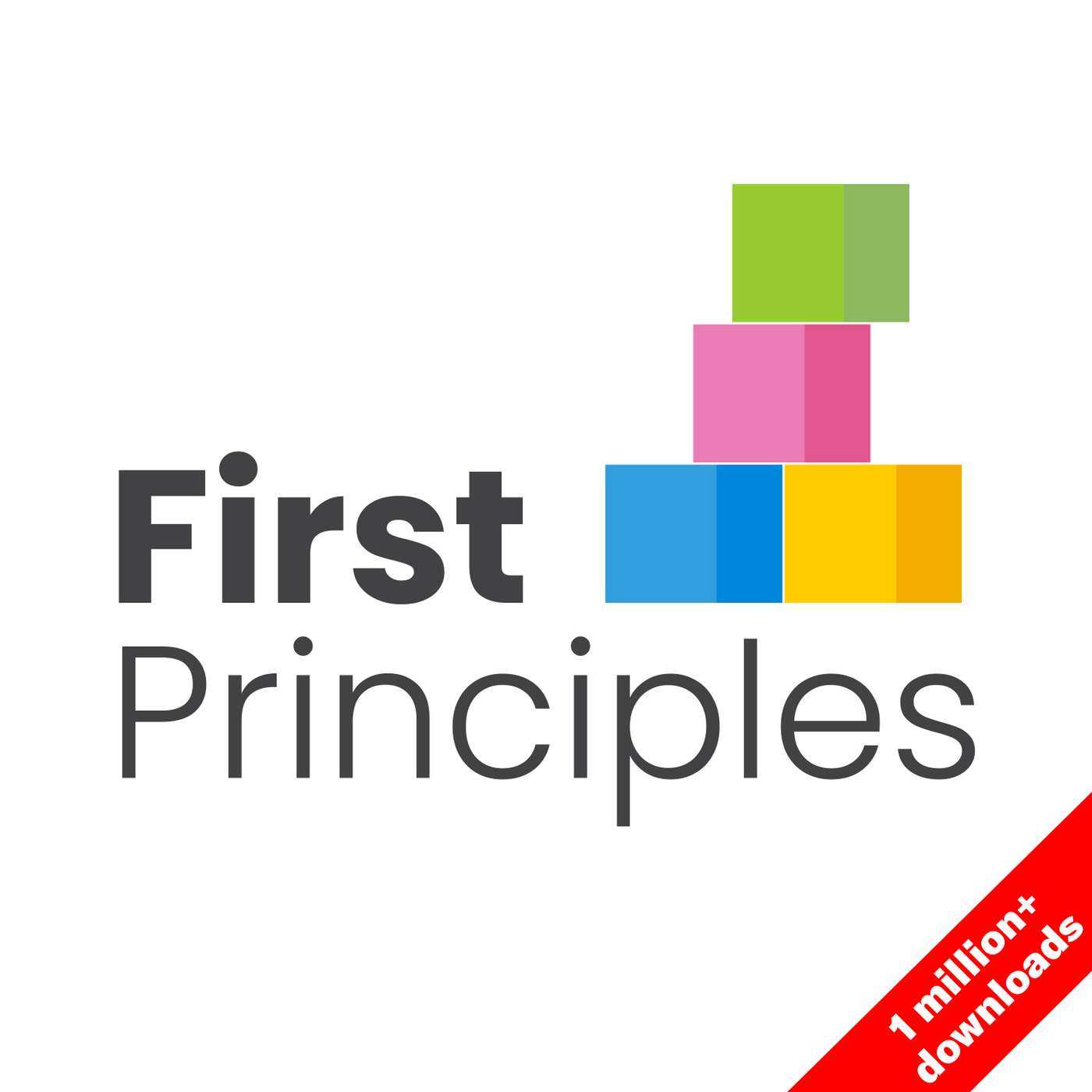
First Principles
The Ken
First Principles is a weekly interview podcast comprising authentic, candid, and insightful conversations between some of India’s most accomplished founders and business leaders, and Rohin Dharmakumar, The Ken’s CEO & co-founder.
From personal philosophies, mental models and decision making frameworks, to reading habits, parenting styles or personal interests, each episode will delve into what makes each of these leaders unique.
From personal philosophies, mental models and decision making frameworks, to reading habits, parenting styles or personal interests, each episode will delve into what makes each of these leaders unique.
Episodes
Mentioned books

Jun 20, 2024 • 7min
Last Principles
First Principles is coming to an end. But it's not the end of the road for you as listeners.We still want to hear from you and know what you expect from the podcasts from The Ken. Let us know with your suggestions and critique.We'd love to know your thoughts and you can let us know here.Also, you can always write to us at fp@the-ken.com with your thoughts.

Jun 13, 2024 • 1h 26min
Five women founders speak about leading with empathy, ambition, and not being apologetic and just focusing on building
Becoming an entrepreneur is a leap of faith. Regardless of when or even if your business sees the light of day, starting up is still a tremendously hard thing for someone to take up, work on and say out loud to the world.The leap of faith still exists when you're a woman founder, but with a bunch of other variables you didn't ask for also thrown in.But I'll tell you what doesn't change. It still takes the same amount of passion, the joy of building, stress, frustration and the ability to manage fires that might go off anytime to keep the ship steady, and eventually succeed in the long run.Being a woman founder does present its own challenges and hurdles that are often unexpected or even patronising. Because if you've decided to jump into the world of terrible and exciting, then these are just additional hoops that you have to jump through.That's why role models matter. I must confess we - I - have been disappointed at not being able to get a lot more woman founders and their stories on First Principles. You can be sure we're trying to change that over time. But in today's supercut episode, we bring together five women founders from earlier episodes.This episode features Vineeta Singh of SUGAR Cosmetics, Smita Deorah of LEAD School, Ruchi Kalra of Oxyzo, Radhika Gupta of Edelweiss Asset Management and Soumya Rajan of Waterfield Advisors.Welcome to First Principles—The weekly leadership podcast from The Ken.Let's get started.----------Apply for the Young Business Leadership Programme!What is it?It is an ambitious and exciting role where we take a handful of talented, ambitious and eager-to-learn graduates from India's top colleges and put them through a two-year program where they will work in different roles and functions at The Ken.And throughout the two years they will learn virtually all key aspects of building, innovating and scaling a modern "journalism as a product" organization, well, from first principles.If you want to understand the "why" of why we're doing this, you'll find the details to that here, but if you're just excited about the opportunity from the little I have told you and you're just thinking about "how" do I apply, here's the link for that.----------Also, have you listened to the latest episode of The First Two Years(or TFTY)—The Early Careers podcast from The Ken?In the latest episode of TFTY, host Akshaya Chandrasekaran goes on a quest to explore how to solicit feedback as requested by a listener of the podcast. Akshaya directed the listener's question to guests on the episode who shared surprising tips and pragmatic ways to ask for feedback. What exactly did they have to say?Listen to the episode here to find out.----------If you haven't already, subscribe to the First Principles newsletter. It's free. All you need to do is sign up, and you'll find a thoughtfully curated newsletter capturing unique insights on the mental models and first principles, along with a curated list of photos and books contributed by the enthusiastic First Principles community.You can sign up here!Also, if you enjoyed listening to this episode, do rate us on your favourite streaming platform, and if you have opinions on what we should be doing differently or just any feedback, good or bad, write to us at fp@the-ken.com. We'll be sure to read it.

Jun 6, 2024 • 1h 7min
Part 2: Manav Garg sold his business and started TogetherFund with Girish Mathrubootham. Naturally, the $150M fund has a founder-operator bias. What does that mean?
In the first part of my conversation with Manav Garg, I introduced him as the founder of Eka Software. This week, I would like to reintroduce Manav as a venture capitalist and the co-founder of Together Fund, a VC firm. Well, you know how I feel about having venture capitalists on First Principles if you've listened to my conversation with Alok Mittal.I had said in that conversation that venture capitalists are facilitators or enablers, not builders or doers.Manav, too, like Alok Mittal earlier, has been at both ends, being a facilitator and also being in the thick of building an organisation. A few months ago, he fully transitioned into being a venture capitalist and has raised almost $150 million for Together Fund's Fund II(Fund Two), which is almost double the $85 million they raised for their first fund. Manav terms Together as a founder and 'operator-led' firm, and that distinguishes it from other VC funds.Manav explained it as, "So we are the people who can, you know, roll our sleeves with them and really help them where they can really think like founders. And our concept was repetition over returns. We want to really think for the founders with empathy and really help them build a global company."If Alok Mittal's story was about turning from a VC to a founder, Manav's is about turning from a founder to a VC. Well, he is sort of both as a co-founder of Together Fund. But the question is, can a founder be a better VC than, well, a VC?Welcome to First Principles—The weekly leadership podcast from The Ken.Let's get started.----------Have you listened to The Ken's early careers podcast, The First Two Years, yet? If you haven't, we've got the perfect episode to start you off. In the latest episode, host Akshaya Chandrasekaran went about exploring how to do networking without making it feel forced and cringe. Check out the episode here!----------Also, if you're still here, help us improve First Principles with your suggestions, feedback, and guests you would wish to see featured in a future episode. Write to us fp@the-ken.com. And if you haven't already, become a part of the First Principles community by signing up for the First Principles newsletter here!
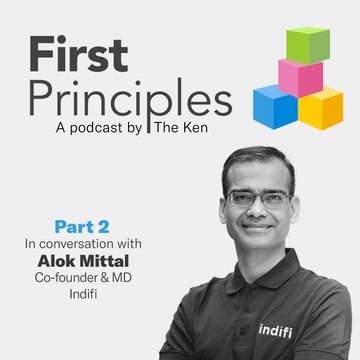
May 30, 2024 • 51min
Part 2: Alok Mittal—teacher, angel investor, former VC—asserts Indifi is not a disruptive business. He also emphasises organisations should not fall into the trap of founder-worshipping
Alok Mittal, former VC and angel investor, discusses the founder-worshipping mindset in startups and the importance of transitioning leadership for long-term success. He also highlights the significance of education in shaping entrepreneurial skills and advocates for a more integrated approach to technological innovation in India.
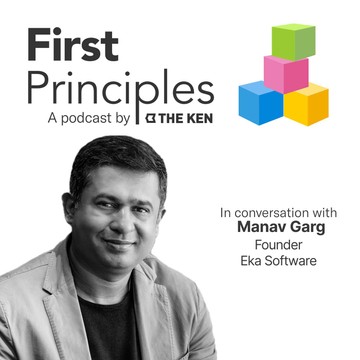
May 23, 2024 • 1h 3min
Part 1: Manav Garg started and ran Eka Software for 20 years before selling it. His #1 advise to founders? Budget 6 months to "manufacture" your co-founders
“As I said, I am from a middle-class family. I was earning $10,000/month, which is a large sum in those days. And sitting in Singapore, Bangkok, travelling around the world. So my the larger question in my mind is that how do I take the decision?” says Manav Garg.Manav Garg, founder and former CEO of Eka Software, a SaaS company that operates in the global commodities trading space. "Former CEO" because Manav started Eka in 2004 and just sold it earlier this year. Since Manav was earning $10K a month back in the early 2000s, we talked about golden handcuffs. You know, when people earn so much that they become risk averse? A lot of people are attracted to the lure of startups but not necessarily the grind that comes with them. Including much, much lower pay. “So, my competition was TriplePoint, Openlink, SAP. Large companies, at that time. $100 million plus companies. So, I started calling them. Cold calling. And few of them didn't pick up my phone.One person luckily picked up my phone saying, ‘Please don't call me again and again. It's not nice. I'm never going to work for Indian company.’ I said, ‘Fine. Since I have you on phone, can I meet you?’He said, ‘No.’He said, ‘No. What will you do by meeting me?’ I said, ‘Let's have coffee. What I will do is, tell me your travel schedule.’ He said, ‘I am flying to London tomorrow, so I am going to be very busy.’ I said, ‘Okay, let me do one thing. I will travel to London next day and I will meet you at Heathrow. Just have a coffee. You anyway will take a shower.’ Most of the people from New York travel to London that red-eye flight, take a shower in the arrival launch. I knew that. I said, ‘I will meet in the arrival launch. Half an hour coffee and then you are free to go.’He said, ‘Fine.’Luckily, he said, ‘Fine.’” It takes a LOT of courage to fly to London to meet someone who said he doesn’t want to work for an Indian company. And a LOT of vision to convince that person to join you. That’s what happened at the end of that 30-minute meeting that stretched to 2 hours. Today, after 20 years as founder, Manav has jumped right back into the ring as the co-founder of venture capital firm TogetherFund, along with Girish Mathrubootham of Freshworks and others. When I asked him about something most potential founders overlooked, his answer was easy: Co-founder selection. “See, in India also, still we have in that cultural mix, where you start up with your college friends because you spend time in dorms together, in college, you went through life's ups and downs together, right? So, therefore, you're very attuned to start up with your friends from college, most likely, that's the most likely case, or from your workplace. You work with somebody in Amazon, Flipkart, Freshworks, Eka, Zoho, so therefore you end up starting up.I personally think that there is also a way to manufacture your co-founders.” Manav advises founders to set aside at least 6 months to “manufacture” their co-founders by just meeting a LOT of people. My conversation with Manav uncovers a lot of insight on how young founders should think about building for the long haul. He did it for 20 years. There’s a lot of very counterintuitive builder wisdom to unpack in today’s conversation.Welcome to First Principles–The weekly leadership podcast from The Ken.Let’s get started.-------------------------Daybreak is now a daily podcast.Listen to the first special episode we released on 17th May: “Why aren’t we scared of chemicals in our skincare anymore?”-------------------------If you love listening to First Principles, we’re sure you will enjoy reading our Sunday newsletter, aptly titled First Principles as well. Sign up here, it’s free.Also, write to us fp@the-ken.com with your feedback, suggestions and guests you would want to see on First Principles.(P.S. A lot of you have written to us over the last few weeks with thoughtful suggestions and excellent feedback. We’ll be sure to take all of it into consideration when putting these episodes together for you.)-------------------------Also, have you checked out The Ken’s new app? It’s packed with a lot of new features. Read all about it here. If you haven’t downloaded it already, here are the links to both iOS and Android.

May 9, 2024 • 47min
Part 2: Jaydeep Barman explains how internet restaurant Rebel Foods and luxury good giant LVMH have more in common than one can imagine
Jaydeep Barman, CEO of Rebel Foods, shares insights on building an internet restaurant empire through experimentation and partnership. Topics include navigating regulatory challenges, innovative business strategies, operating system philosophy, personal growth, and fitness metrics and recommendations.
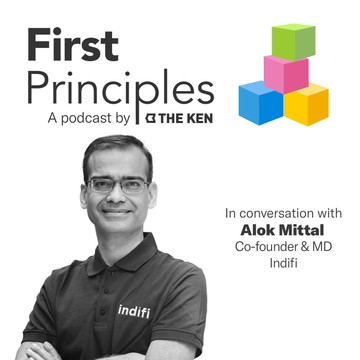
May 2, 2024 • 1h 14min
Part 1: Alok Mittal of Indifi on why org culture should not be defined but discovered
Alok Mittal, experienced founder and VC, discusses the importance of mid-management in org building. He shares insights on failures, risk assessment as VC & founder, and lending to SMEs. Alok's journey from VC to entrepreneur, strategic decision-making, and fostering company culture are also explored.
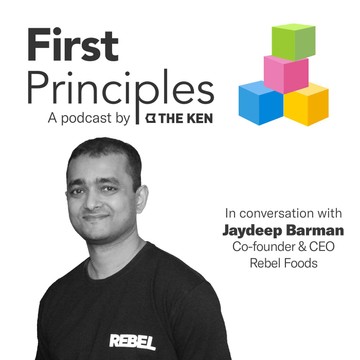
Apr 25, 2024 • 1h 29min
Part 1: Jaydeep Barman of Rebel Foods on why his business is 'misunderstood'—and why that's a good thing
Jaydeep Barman, Co-founder and CEO of Rebel Foods, discusses the challenges of scaling a food business, transitioning from physical stores to cloud kitchens, and the importance of controlling food production. He also shares insights on strategic market analysis, recruiting passionate talent, and leadership evolution at Rebel Foods.

Apr 18, 2024 • 41min
Part 2: Chetan Maini of SUN Mobility on finding his 'true north', again
When Chetan Maini – co-founder and chairman of SUN Mobility – stepped down as Mahindra Reva CEO in 2015, he wasn’t thinking what was the next venture to start. In fact even though he stepped down he was still involved in the space.His time was still spent in understanding the possibilities electric mobility could unlock for the world and how these possibilities were being explored around the world. He was still involved in setting up and innovating the Formula E division at Mahindra, he still helped Anand Mahindra every now and then on strategic matters in Mahindra’s electric division, he was working with the government, he also helped the BMTC take a part of its fleet electric and the list goes on.One could say he stepped down to get a better view of the possibilities in electric mobility. He was not looking for opportunities actively during this period, he was merely synthesising what possibilities were feasible.He did travel across the world during this break but even during that time he was looking at the electric mobility solutions and innovations that were present in the places he visited.He realised the possibilities in battery swapping as an alternative to charging and filed patents long before he became part of what is SUN Mobility today.In the first part of our conversation with Chetan we discussed broadly how the sector has evolved, what SUN Mobility has set out to achieve, how their BaaS or Battery as a Service model is an alternative to charging your vehicle and a whole lot more.In this episode we discuss how Chetan figured out what was next for him, the mental models he applies at SUN Mobility, how he’s built a team that speaks its mind and a lot more.Welcome to First Principles – The weekly leadership podcast from The Ken.Let’s get started.

Apr 11, 2024 • 1h 18min
From succeeding in overcrowded markets to creating customer delight, five founders share their secrets
Radhika Gupta from Edelweiss and other founders share insights on succeeding in competitive markets and prioritizing customer delight. Topics include company missions, target consumers, evolution of financial services, customer journey in tier two cities, challenges in the hospitality industry, supply chain efficiency in food tech, and forecasting demand in supply chain management.


